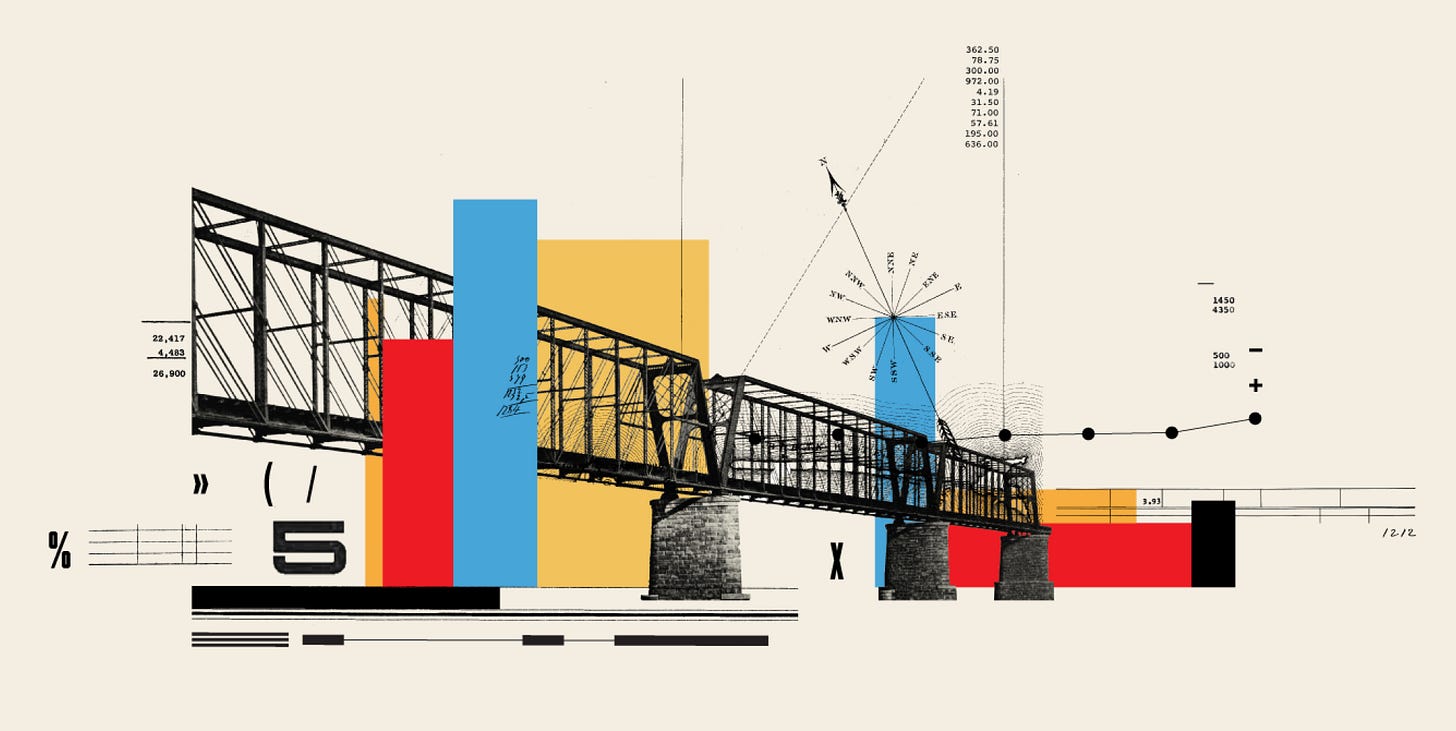Introducing the Library of Economic Possibility (LEP)
A knowledge-base for the next economy.
We’re excited to announce the launch of the Library of Economic Possibility (LEP) — a new research and media platform. Our mission is to advance public knowledge of economic policies that may help build a thriving 21st century economy.
Today, most knowledge about ideas like basic income, land value tax, and codetermination is scattered across dense academic texts, trapped in PDFs, and locked behind paywalls. LEP offers a platform that consolidates the scattered landscape of empirical research and makes it accessible to all.
Our searchable network of insights, together with our comprehensive policy reports, makes it easy to discover, organize, and share powerful economic ideas. We hope these tools may help build a more informed, inclusive, and expansive culture of debate around how to design the next economy, one policy at a time.
Although this website is the product of years of research, design, and debate, it represents only the first step towards our vision for LEP. We hope you’ll join us on this journey.
For now, have a look around, let us know what you think, and if you’d like to help support our launch, consider sharing the website.
What comes after neoliberalism should work better
During the 1970s, the US embarked on a new economic experiment. Although the term gets thrown around a lot nowadays, we use “neoliberalism” to define the specific set of ideas and methodologies that rose to power as a response to the 1971 stagflation crisis, shaping the post-1980 American economic system.
Neoliberalism was defined by ideas like limiting the role of government to correcting market failures, privatizing public services in the name of efficiency, keeping taxes on high-earners and capital low so as not to discourage investment or growth, tying social welfare to work requirements, broad-spectrum deregulation (especially in the financial sector), and the idea that federal deficits necessarily lead to inflation.
These ideas promised economic growth and social stability. Neoliberalism, its proponents asserted, would unleash business dynamism, innovation, economic growth, and shared prosperity.
Four decades later, the conclusion of the experiment is clear: neoliberalism failed1.
Rather than unleashing business dynamism, the rate of new company formation has fallen:
Meanwhile, economic growth has slowed since the neoliberal turn…
…and the prosperity that has been generated has not been widely shared.
We need a new economic system — one that works.
One reason we’re so excited to work on LEP is because these changes are already underway. The unprecedented events of recent years have opened the Overton Window to new economic ideas that weren’t taken seriously in the mainstream before. Georgism (which supports a land value tax) saw a revival in popularity. In her 2020 primary campaign, Elizabeth Warren campaigned on codetermination (worker representation on corporate boards). Covid stimulus checks sent by both the Biden and Trump administrations were effectively a short-term experiment in basic income and even congressional Republicans are proposing policies like universal child allowance.
A new system is already taking shape, from grassroots movements to the White House. Our focus is on advancing public knowledge around policies that deserve a place in the debate over the components that might actually build that system.
So what does LEP actually offer?
LEP has two main elements:
The Library - our insight database, a searchable network of economic knowledge.
Policy Reports - where you can learn everything about a powerful economic idea, in one place.
Let’s take a quick look at each.
The Library
The heart of LEP is a searchable network of economic knowledge. Here, you can search and explore the database through any of our five information classes: insights, sources, authors, tags, and reports.
In addition, you can use our advanced filters to hone in on specific policies, or relationships between information classes.
For example, you can select “basic income,” and scroll through all of our insights related to it. Or, for more precision, say you want to learn more about how basic income might affect entrepreneurship. Add the “entrepreneurship” filter, and there you have it:
There’s a lot more to discover. You could visit the “mental health” tag page and explore all the related insights and sources. Or visit a particular paper you’re interested in, like “What Does Codetermination Do,” and get a quick overview of all the insights we derived from that paper.
The database is full of different ways to discover information — let us know if you have ideas for features that would make the information more useful to you.
Policy Reports
Our reports — the first of which cover land value tax, codetermination, and basic income — draw on all the insights from the database related to a particular policy, providing an introduction to what the policy is and an overview of the current evidence.
Since our belief is that neoliberalism has failed on its own terms, our reports are structured to assess whether alternatives can outperform neoliberalism on its own criteria of providing economic growth and social stability:
I. Introduction: What is the policy and what are the main points for & against?
II. Growth: What does the research say about the policy’s potential impacts on things like GDP, productivity, innovation, inflation, labor markets, entrepreneurship, investment, or efficiency?
III. Stability: What does the research say about the policy’s potential impacts on social, economic, and environmental stability? These include dimensions such as poverty and inequality, physical and mental health, education, crime, wages, job satisfaction, equity, sustainability, and public sentiment.
IV. Implementation: What are the details of policy design, political strategy, and economic feasibility to consider for implementing the policy in the US economy?
Reports are where a feature we’re perhaps a little unreasonably excited about lives: insight cards.
Every insight from The Library we use in the report is underlined in yellow. If you click, a card pops up. These let you discover more about any insight that intrigues you (further context, what source it came from, etc).
Click through, & lo! You're surfing the database.
What’s next for LEP?
We have lots of plans. Now that LEP is open to the public, we’re turning our attention towards three main areas:
Adding new policies (do you have ideas for policies we should include? let us know).
Building interfaces to support community participation in the production of LEP’s knowledge-base.
Multimedia projects that help bring the information to life.
But we’re always happy to hear from you — if you have ideas for what you think LEP should focus on or build next, please let us know.
The Team
LEP was co-founded by Oshan Jarow and Kasey Klimes. In addition, LEP wouldn't be possible without our network of advisors, collaborators, and friends. In particular, we'd like to thank:
Yancey Strickler (advisor)
Callum Flack (developer + designer)
Ben Follington (developer)
Cristiana Couceiro (illustrator)
Audra Sim (editor)
Common Future (fiscal sponsor)
Alex Deaton (animator)
How to support LEP
LEP is an independent, nonpartisan organization. Our platform is free, and stewarded in service of advancing public knowledge. We’re funded by generous donations, small and large. If we can build a community of small donors, we can build LEP with community and without compromises.
If you’d like to support our work, you can do so here:
one-time donation here // recurring donation here.
LEP is also fiscally sponsored by Common Future, a 501(c)3 nonprofit. If you represent a foundation or giving organization interested in making a charitable contribution, please contact us.
Your support is deeply appreciated.
Our preferred triad of supporting evidence consists of: The Empirical Failures of Neoliberalism, the introduction to Rethinking Capitalism: Economics and Policy for Sustainable and Inclusive Growth, and Larry Kramer’s Beyond Neoliberalism: Rethinking Political Economy.








It is now 2025, and this project started slowing down in 2024, according to my initial observation. I hope I have the wrong impression. My Federal policy priority could create significant economic insights, allowing for a better collaborative local community, nationwide-wide pep talk, planning, productive, constructive social community growth, and efficiencies. As a Vietnam-era veteran, I became interested back in 1979, in San Jose, CA to a local Congressman's bill H.R. 2206, "The National {volunteer} Service Act" that proposed challenging all American youth between their 17th and 18th birthdays to local/nationwide, on-and-off, one-year, civic values talks, marketing of considering of public service-learning voluntarism with non-profits, contracted community {AmeriCorps, etc.} or military service. It included required basic feedback at the 18th birthday of Yes, No, or Maybe towards further interest in a service-learning investment of time and effort. This Federal law proposed justifying this Federal intrusion into local educational priorities as a domestic and national security enhancement to the male-only draft registration of the Selective Service Systems insurance policy for extended (years) national emergency needing additional human resources. I look forward to any comments on the "Economic Possibilities" of this 1979 proposal that I have tried to keep awareness alive over these last 45 years. @pjesella on X.